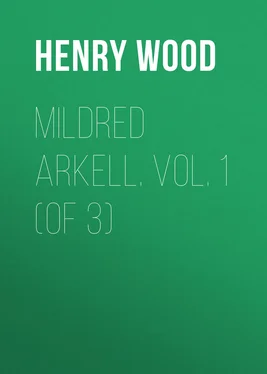Henry Wood - Mildred Arkell. Vol. 1 (of 3)
Здесь есть возможность читать онлайн «Henry Wood - Mildred Arkell. Vol. 1 (of 3)» — ознакомительный отрывок электронной книги совершенно бесплатно, а после прочтения отрывка купить полную версию. В некоторых случаях можно слушать аудио, скачать через торрент в формате fb2 и присутствует краткое содержание. Жанр: foreign_sf, literature_19, foreign_antique, foreign_prose, на английском языке. Описание произведения, (предисловие) а так же отзывы посетителей доступны на портале библиотеки ЛибКат.
- Название:Mildred Arkell. Vol. 1 (of 3)
- Автор:
- Жанр:
- Год:неизвестен
- ISBN:нет данных
- Рейтинг книги:4 / 5. Голосов: 1
-
Избранное:Добавить в избранное
- Отзывы:
-
Ваша оценка:
- 80
- 1
- 2
- 3
- 4
- 5
Mildred Arkell. Vol. 1 (of 3): краткое содержание, описание и аннотация
Предлагаем к чтению аннотацию, описание, краткое содержание или предисловие (зависит от того, что написал сам автор книги «Mildred Arkell. Vol. 1 (of 3)»). Если вы не нашли необходимую информацию о книге — напишите в комментариях, мы постараемся отыскать её.
Mildred Arkell. Vol. 1 (of 3) — читать онлайн ознакомительный отрывок
Ниже представлен текст книги, разбитый по страницам. Система сохранения места последней прочитанной страницы, позволяет с удобством читать онлайн бесплатно книгу «Mildred Arkell. Vol. 1 (of 3)», без необходимости каждый раз заново искать на чём Вы остановились. Поставьте закладку, и сможете в любой момент перейти на страницу, на которой закончили чтение.
Интервал:
Закладка:
"I never said I had any thought of marrying her."
"As you please. Marry her; and I swear that I will leave all I possess away from you and yours. Before Heaven, I will keep my oath!"
And now we must go to the following morning, to the house of Mr. Arkell. These little details may appear trivial to the reader, but they bear their significance, as you will find hereafter; and they are remembered and talked of in Westerbury to this day.
The breakfast hour at Mr. Arkell's was nine o'clock. Some little time previous to it, William was descending from his room, when in passing his father's door he heard himself called to. Mr. Arkell appeared at his door in the process of dressing.
"William, I heard the carriage go out a short while ago. Have you sent it anywhere?"
Just the question that William had anticipated would be put. Being released now from his promise, he told the truth.
"Over to Purford! Why could he not have gone by the coach?"
"I don't know I'm sure," said William; and the same thought had occurred to himself. "I did not like to promise him without speaking to you, hut he made such a favour of it, and—I thought you would excuse it. I fancy he is on worse terms than ever with his father, and feared you might tell him."
"He need not have feared that: what should I tell him for?" was the rejoinder of Mr. Arkell as he retreated within his room.
Now it should have been mentioned that Mary Hughes was engaged to work that day at Mr. Arkell's. It was regarded in the town as a singular coincidence; and, perhaps, what made it more singular was the fact that Mrs. Arkell's maid, Tring (who had lived in the house ever since William was a baby, and was the only female servant kept besides the cook), had arranged with Mary Hughes that she should go before the usual hour, eight o'clock, so as to give a long day. The fact was, Mary Hughes's work this day was for the maids. It was Mrs. Arkell's custom to give them a gown apiece for Christmas, and the two gowns were this day to be cut out and as much done to them as the dressmaker, and Tring at odd moments, could accomplish. Mary Hughes, naturally obliging, and anxious to stand well with the servants in one of her best places, as Mrs. Arkell's was, arrived at half-past seven, and was immediately set to work in what Tring called her pantry—a comfortable little boarded room, a sort of offshoot of the kitchen.
Mr. Arkell spoke again at breakfast of this expedition of Robert Carr's. It wore to him a curious sound—first, that Robert could not have gone by the coach, which left Westerbury about the same hour, and had to pass through Purford on its way to London; and, secondly, why the matter of borrowing the carriage need have been kept from him. William could not enlighten him on either point, and the subject dropped.
Breakfast was over, and Mr. Arkell had gone into the manufactory, when the carriage came back. Philip drove at once to the stables, and William went out.
"Well," said he, "so you are back!"
"Yes, sir."
Philip began to unharness the horse as he spoke, and did not look up. William, who knew the man and his ways well, thought there was something behind to tell.
"You have driven the horse fast, Philip."
"Mr. Carr did, sir; it was he who drove. I never sat in front at all after we got to the three-cornered field. He drove fast, to get on pretty far before the coach came up."
"What coach?" asked William.
"The London coach, sir. He's gone to London in it."
"What! did he take it at Purford?"
"We didn't go to Purford at all, Mr. William. He ain't gone alone, neither."
"Philip, what do you mean?"
"Miss Hughes—the young one—is gone with him."
"No!" exclaimed William.
"It was this way, sir," began the man, disposing himself to relate the narrative consecutively. "I had got the carriage ready and waiting by a few minutes after eight, as he ordered me; but it was close upon half-past before he came, and we started. 'I'll drive, Philip,' says he; so I got in beside him. Just after we had cleared the houses, he pulls up before the three-cornered field, saying he was waiting for a friend, and I saw the little Miss Hughes come scuttering across it—it's a short cut from their house, you know, Mr. William—with a bit of a brown-paper parcel in her hand. 'You'll sit behind, Philip,' he says; and before I'd got over my astonishment, we was bowling along—she in front with him, and me behind. Just on this side Purford he pulled up again, and waited—it was in that hollow of the road near the duck-pond—and in two minutes up came the London coach. It came gently up to us, stopping by degrees; it was expecting him—as I could hear by the guard's talk, a saying he hoped he'd not waited long—and they got into it, and I suppose he's gone to London. Mr. William, I don't think the master will like this?"
William did not like it, either; it was an advantage that Robert Carr had no right to take. Had the girl forgotten herself at last, and gone off with him? Too surely he felt that such must be the case. He saw how it was. They had not chosen to get into the coach at Westerbury, fearing the scandal—fearing, perhaps, prevention; and Robert Carr had made use of this ruse to get her away. That there would be enough scandal in Westerbury, as it was, he knew—that Mr. Arkell would be indignant, he also knew; and he himself would come in for a large portion of the blame.
"Philip," he said, awaking from his reverie, "did the girl appear to go willingly?"
"Willingly enough, sir, for the matter of that, for she came up of her own accord—but she was crying sadly."
"Crying, was she?"
"Crying dreadfully all the way across the field as she came up, and along in this carriage, and when she got into the coach. He tried to persuade and soothe her; but it wasn't of any good. She hid her face with her veil as well as she could, that the outside passengers mightn't see her state as she got in; and there was none o' the inside."
William Arkell bit his lip. "Carr had no business to play me such a turn," he said aloud, in his vexation.
"Mr. William, if I had known what he was up to last night, I should just have told the master, in spite of the half-sovereign he gave me."
"Oh, he gave you one, did he?"
"He gave me one last evening, and he gave me another this morning; but, for all that, I should have told, if I'd thought she was to be along of him. I know what the master is, and I know what he'll feel about the business. And the two other Miss Hughes's are industrious, respectable young women, and it's a shabby thing for Mr. Carr to go and do. A fine way they'll be in when they find the young one gone!"
"They can't have known of it, I suppose," observed William, slowly, for a doubt had crossed his mind whether Robert could be taking the young girl away to marry her.
"No, that they don't, sir," impulsively cried the man. "I heard him ask her whether she had got away without being seen; and she said she had, as well as she could speak for her tears."
Конец ознакомительного фрагмента.
Текст предоставлен ООО «ЛитРес».
Прочитайте эту книгу целиком, купив полную легальную версию на ЛитРес.
Безопасно оплатить книгу можно банковской картой Visa, MasterCard, Maestro, со счета мобильного телефона, с платежного терминала, в салоне МТС или Связной, через PayPal, WebMoney, Яндекс.Деньги, QIWI Кошелек, бонусными картами или другим удобным Вам способом.
Интервал:
Закладка:
Похожие книги на «Mildred Arkell. Vol. 1 (of 3)»
Представляем Вашему вниманию похожие книги на «Mildred Arkell. Vol. 1 (of 3)» списком для выбора. Мы отобрали схожую по названию и смыслу литературу в надежде предоставить читателям больше вариантов отыскать новые, интересные, ещё непрочитанные произведения.
Обсуждение, отзывы о книге «Mildred Arkell. Vol. 1 (of 3)» и просто собственные мнения читателей. Оставьте ваши комментарии, напишите, что Вы думаете о произведении, его смысле или главных героях. Укажите что конкретно понравилось, а что нет, и почему Вы так считаете.












